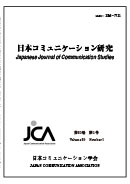In interpersonal communication, a sender’s lack of verbal communication such as replies and greetings, and nonverbal communication such as nodding and smiling can cause discomfort and stress to the receiver. In Study 1, a scale was created to probe into the essence of “unfriendliness,” or “buaiso(無愛想)” in Japanese, focusing on traits and behaviors that people would characterize as being unfriendly. Factor analysis was conducted on the unfriendliness scale, revealing a three factors structure: communication anxiety, awkward self-presentation, and unpleasantness. In Study 2, we examined how happiness, empathy, and self-esteem, relate to unfriendliness through multiple regression analysis. Results indicated that those who were unfriendly were less likely to be empathetic, nor happy over all three factors of unfriendliness, while self-esteem was not associated with any. Suggestions toward cross-validation of the qualities of unfriendliness across cultures were made.
抄録全体を表示
